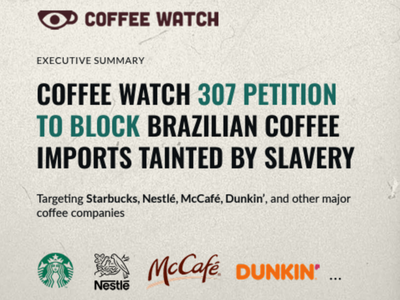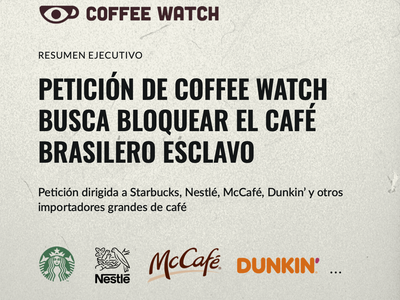FOR IMMEDIATE RELEASE
New Lawsuit and U.S. Customs and Border Patrol Complaints Allege Slavery and Human Trafficking in Starbucks’ Brazilian Coffee Supply Chain
Eight trafficked workers bring a Trafficking Victims Protection Reauthorization Act lawsuit against Starbucks alleging slavery, forced labor on Brazilian coffee farms
“307” Petition to U.S. Customs and Border Patrol threatens to halt U.S. imports of Brazilian coffee tainted by slavery and forced labor; names Starbucks, Nestlé, JDE, Dunkin’, Illy, and McDonald’s
WASHINGTON, D.C., 24 April 2025 – Starbucks was dealt a double blow today as International Rights Advocates filed a U.S. lawsuit against the coffee titan alleging trafficking and Coffee Watch filed a petition with U.S. customs authorities asking the government to block imports from Brazil to the U.S. of coffee tainted by slavery and forced labor by top importers including Starbucks, Nestlé, JDE, Dunkin’, Illy, and McDonald’s. The petition could end slavery-tainted coffee imports to the U.S. from Brazil, a decision that would have significant consequences for Starbucks: the company relies heavily on coffee from Latin America, especially as escalating trade wars threaten Asian coffee supply chains.
“The coffee industry, led by Starbucks, has slaves working in its supply chain right this minute, and we must stop this abuse, starting in Brazil, as the world’s top coffee producer,” said Etelle Higonnet, Coffee Watch Founder and Director. “We’re talking about a multi-billion-dollar coffee industry and giant corporations like Starbucks that have failed to ensure their supply chains are free of horrific human rights abuses. Starbucks must take action.”
The “307” petition was filed to the U.S. Customs and Border Patrol and cites the lawsuit filed on behalf of eight workers who were trafficked and forced to work harvesting coffee in Brazil for five farms that sell to Cooxupé, a major Starbucks supplier and the most powerful Brazilian coffee company. The case is brought under the Trafficking Victims Protection Reauthorization Act (“TVPRA”), 18 U.S.C. § 1595 et. seq., in the U.S. District Court for the District of Columbia. The workers seek to represent a class of the thousands of workers in Brazil who are systematically trafficked and forced to work harvesting Starbucks coffee under “slavery-like conditions,” according to Brazilian government reports. The Complaint documents the long history of extreme abuse of coffee workers in Brazil, and widespread trafficking.
Terry Collingsworth, IRAdvocates’ founder and attorney for the Plaintiffs, added, “Slavery was banned in the U.S. in 1865 and in Brazil in 1888, but to this day Starbucks’ coffee production in Brazil is based on a system of trafficking and slavery. Consumers are paying obscene amounts for a cup of Starbucks coffee that was harvested by trafficked slaves. It is time to hold Starbucks accountable for profiting from human trafficking.” Speaking to consumers, he added, “Unless you think slavery and trafficking are okay in 2025, let Starbucks know what you think of this blatant disregard for human rights.”
SLAVERY CONDITIONS: BRAZIL’S WORST-KEPT SECRET
Relying on an extensive body of evidence of slavery and forced labor in coffee harvesting in Brazil, Coffee Watch filed its petition today with the U.S. Customs and Border Protection Agency (CBP) under Section 307 of the Tariff Act of 1930, 19 U.S.C. § 1307. Coffee Watch asks the U.S. to block imports of coffee from Brazil produced using slavery and forced labor, by Starbucks and other industry heavy hitters like Jacobs Douwe Egberts, Dunkin’, Illy, McCafé, and Nestlé in addition to products from Cooxupé and from the above-mentioned five coffee farms. The Petition was written with assistance from the University of Wyoming College of Law Human Rights Clinic and other experts. Coffee Watch’s 307 Petition cites testimonies of recently freed slaves who are the Plaintiffs in the TVPRA case filed by IRAdvocates – who were trafficked as well as enslaved.
To show how widespread, systematic, and longstanding the problem is, the TVPRA Complaint and the 307 Petition summarize and present every known report of slavery and forced labor on coffee plantations in Brazil documented by NGOs, journalists, Brazilian authorities, and U.S. governmental reports. For decades, the coffee industry in Brazil has relied on slavery and forced labor, often with internal migrants working in abusive conditions, for low or no wages, in unsanitary, overcrowded housing, facing violence and threats. The industry, including coffee giant Starbucks, knew about and decided to profit from the widespread pattern of trafficking and slavery in Brazilian coffee production.
Even though labor inspectors in Brazil have only inspected circa 0.1% of coffee farms in Brazil to date, between 1996 and 2023, the Brazilian Labor Inspection Department found 3,700 workers in slave-like conditions in coffee plantations throughout Brazil that directly supplied Starbucks and other major brands. As of IRAdvocates’ investigation in Brazil in March of 2025, coffee workers continue to be trafficked and forced to work under slavery-like conditions for Starbucks and other major brands.
“Clearly, Starbucks has not been deterred by public exposure of its reliance on slavery so we are turning to the courts and CBP to force them to honor their own promise made in their “Code of Conduct” to comply with the law and honor the fundamental rights of workers,” said Attorney Collingsworth.
In 2023, the coffee industry was the number one source of governmental slave rescues in Brazil, making up 11.4% of the total number of rescues from 2013 to 2023. Brazil is the world’s top coffee producer, producing approximately 39% of the world’s coffee. In 2022, Brazil exported over $8 billion in coffee products, with U.S. coffee imports totaling nearly $2 billion. Coffee has been, and continues to be, one of the most important economical stimulants to Brazil’s export economy. There are over 200,000 coffee farms in Brazil, employing roughly 8 million farmers and farmworkers. Some Brazilian coffee farms are immense. One Brazilian plantation allegedly produces more coffee than all of Bolivia.
Coffee Watch calls on CBP to protect victims of slavery and forced labor in coffee, as it is so dangerous for workers to speak out and defend themselves. Brazil is one of the most dangerous and restrictive countries for environmental and human rights defenders in the world. For example, four inspectors have been murdered in Unaí, Minas Gerais, while inspecting rural labor conditions and Brazilian advocacy group CONECTAS reports that in Minas Gerais, conflicts between union leaders and human rights defenders against slave labor led to 420 murders between 2014 to 2023.
MORE TROUBLE BREWING FOR STARBUCKS
These actions spell more trouble for Starbucks amid executives’ ongoing attempts to turn around the business. In addition to these serious allegations of abusive labor practices in Brazil, the coffee giant has come under fire for abusive practices in Mexico and China, tax schemes in Switzerland, and a protracted labor dispute in the U.S.
Ms. Higonnet added, “Coffee has so much potential to uplift, to make the world a better place with every cup – yet at present the industry has trapped millions in extreme poverty, and that poverty opens the door to myriad labor abuses including widespread child labor, forced labor, and slavery. It’s time for every coffee company to commit to stopping this cycle across the globe.”




